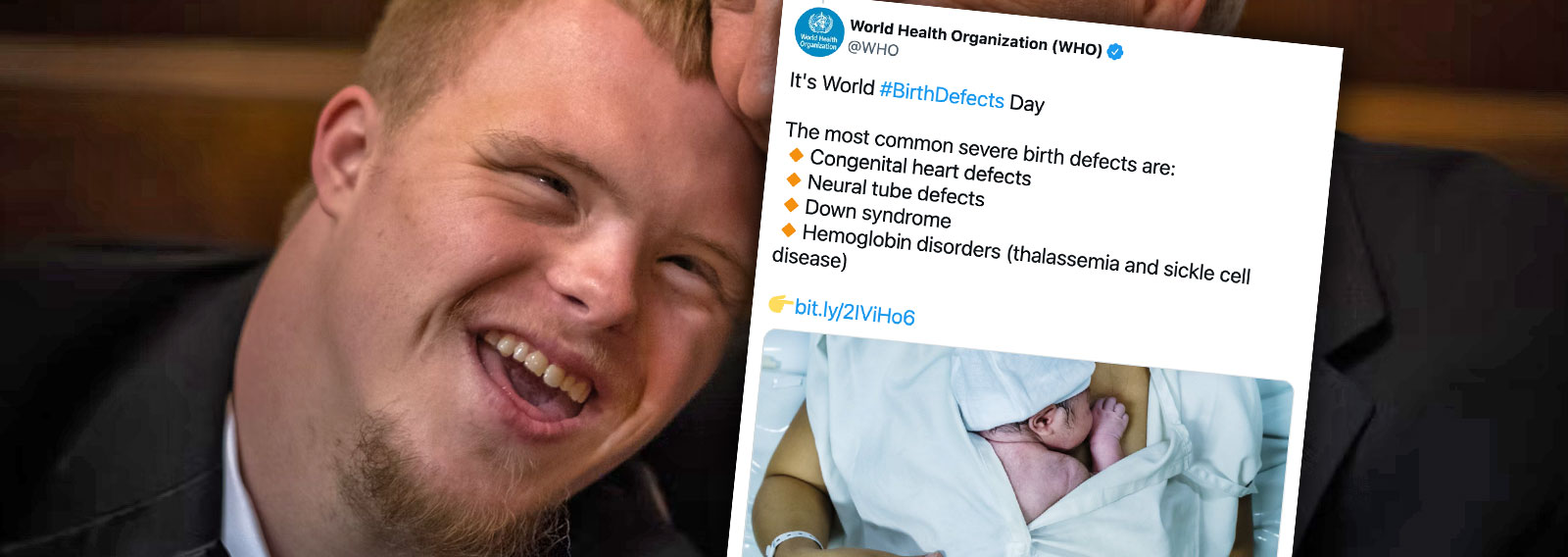In a brazen move, the “woke” World Health Organisation has shifted Down Syndrome onto its list of birth defects.
The change appears to have been made in February, with the UN-backed agency stating: “The most common severe birth defects are heart defects, neural tube defects and Down syndrome.”
The documented advice from the WHO shifts Down Syndrome away from “genetic disability” in favour of the term “genetic abnormality,” akin to a disease, such as “cystic fibrosis.”
In a March 3 Twitter post, the pro-industrial abortion organisation doubled down on its reclassification, writing:
‘Today is World #BirthDefects Day! Most birth defects can be prevented and treated with access to quality maternal and newborn care. Yet, every year, they cause the deaths of close to 250,000 babies 👶 within just 1 month of birth.
The most common severe birth defects are:
– Congenital heart defects
– Neural tube defects
– Down syndrome
– Hemoglobin disorders (thalassemia and sickle cell disease)’
The news contradicts current assertions from at least one official Australian government source which states, “Down Syndrome is not an illness or a disease. Down syndrome is caused when a person is born with an extra chromosome.”
The information sheet adds, “Most of the young people growing up with Down syndrome today will lead quite ordinary lives in the community. Some people with Down syndrome may not need much help to lead an ordinary life, while others may require a lot of support.”
The advocacy organisation, Down Syndrome Australia, agrees. They define Down syndrome as a ‘genetic condition,’ not an illness.
Parents of children with the chromosomal variant, took to social media to voice their disgust in the WHO’s comments section. Posting pictures of their loved ones, they argued:
“Please could you explain how #DownSyndrome is a birth defect in the context of the determining criteria you are using. Surely you mean #GeneticCondition? The presence of an extra chromosome does not make my son defective and I do not see any defect in this image!”
One dad wrote, “So you are telling me this girl is a ‘birth defect’? Down syndrome is not a birth defect! Time to educate yourselves.”
Another said, “#DownSyndrome is NOT a severe birth defect that is preventable. It is a genetic variation. This post is false and needs to be edited/removed. I’m appalled that the World Health Organization doesn’t know the difference. PS nothing about my son is defective.”
The WHO’s reclassification of Down Syndrome appears to be a further slide towards widening a “life unworthy of life” justification for aborting the pre-born diagnosed with the extra chromosome.
The concerns are well-founded.
Many would recall the exceptional argument put forward by Frank Stephens in 2017, when he addressed a United States House Appropriation Subcommittee, telling those present, “The people pushing this particular final solution are saying that people like me should not exist.”
In January 2022, during the annual Washington DC March for Life rally, Down Syndrome advocacy personality, 36-year-old Katie Shaw, called for adoption to replace abortion.
Shaw echoed growing sentiments shared across the world, which condemns Down Syndrome eradication programs as a systematic denial of the right to life.
The Global Down Syndrome Foundation reported 67% of unborn Down Syndrome babies in the United States between 1995-2011 had been aborted.
The number increases for different countries, with Iceland leading the way, “irradicating” Down Syndrome births in 2017.
CBS News explained, “the vast majority of women — close to 100 percent — who received a positive test for Down syndrome terminated their pregnancy.”
The 2017 exposition placed France at 77%, and Denmark at 98%.
GBSF president Michelle Sie Whitten called the 2017 CBS report “alarming.”
Whitten said in response: “Every woman and every pregnancy is unique, but every woman should be given the facts including examples of how people with Down syndrome can, and are contributing to society, and reaching their potential…”
She added, “the problem is that funding for research and medical care has dropped precipitously over the last two decades and we need to change that.”
Although the World Health Organisation’s reclassification appears to be following Iceland’s abortion laws, which categorise Down Syndrome as a deformity, the Global Down Syndrome Foundation is yet to issue an official response.





















